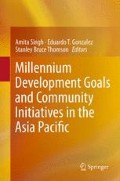Abstract
The development of e-government in Indonesia, as mandated by the President Instruction No. 3 Year 2003 on Policy and National Strategy for Development of e-Government, is an effort to develop an electronic-based government so as to improve the quality of public services and to realize good governance. The anticipated benefits of e-government include efficiency and effective, improved services, better accessibility of public services and more participative, transparent and accountable government management. However, due to the complex process during its development, e-government has not been implemented successfully, especially in government institutions. Based on research on best practices of e-government implementation in several regions, it is found that the key factor in capacity building for e-government is strong leadership. The leadership in question mostly has the ability to manage personnel, equipment and other organizational resources and to use ICT to solve problems and achieve the vision and mission of his organization. Leadership that has such competencies is commonly known as e-leadership.
Access this chapter
Tax calculation will be finalised at checkout
Purchases are for personal use only
References
Aisonhaji (2008) E-leadership: vital success factors of e-gov implementation. http://aisonhaji.wordpress.com/2008. Retrieved 1 Dec 2008
Allen BA, Juillet L, Paquet G, Roy J (2001) E-governance and government online in Canada: partnerships, people and prospects. Govern Inf Q 18:93–104
Avolio B (1999) Full leadership development building the vital forces in organizations. Sage, New York
Bass BM (1985) Leadership and performance beyond expectation. The Free Press, New York
Bass BM, Riggio RE (2005) Transformational leadership, 2nd edn. Lawrence Erlbaum Associates, Hillsdale
Boudreau M et al (1998) Going global: using information technology to advance the competitiveness of the virtual transnational organization. Acad Manag Exec 12(4):120–128
Burke R (2008) E-leadership. Retrieved 5 Dec 2008, from http://www.metafuture.org/articlesbycolleagues
Burns JM (1978) Leadership. Harper & Row, New York
Ciulla JB (1997) Ethics and critical thinking in leadership education. J Leadersh Org Stud 3(3):110–119
Haryono T, Widiwardono YK (2010) Current status and issues of e-government in Indonesia. Retrieved 15 Oct, from http://www.aseansec.org/13757.htm
Heeks R, Davies A (1999) Different approaches to information age reform. In: Heeks R (ed) Reinventing government in the information age: IT public sector reform. Routledge, Abingdon/London, pp 22–48
Hjelm LA, McCarthy TJ (2001, May) International electronic transactions: ensuring compliance with U.S. customs and international trade laws. The Metropolitan Corporate Counsel
Janssen D, Rotthier S, Snijkers K (2000) If you measure it they will score: an assessment of international benchmarking. J Inf Polity 9(3,4)
Leithwood K, Jantzi D (1990) Transformational leadership: how principals can help school cultures. Paper presented at the annual meeting of the Canadian Association for Curriculum Studies, Victoria, British Columbia
Luthans F, Avolio BJ (2003) Authentic leadership: a positive developmental approach. In: Cameron KS, Dutton JE, Quinn RE (eds) Positive organizational scholarship. Berrett-Koehler, San Francisco
Raharjo B (2008) as quoted by Aisonhaji (2008) E-leadership: vital success factors of e-gov. implementation. Retrieved 1 Dec, from http://aisonhaji.wordpress.com
Rees E (2006) Seven principle of transformational leadership, http://ww.pastors.com/articles 9/21/2012
Rogers EM (1995) Diffusion of innovations. The Free Press, New York
Soebhan SR (2004) Model reformasi birokrasi Indonesia (Indonesian bureaucracy model). Retrieved 10 Oct, from syafuan@indonet.com
Suprawoto (2008) Implementing e-gov, e-leadership must be strong first. Retrieved 5 Dec, from yunus@wartaegov.com
The Government of the Republic of Indonesia (2001) President instruction No. 6 Year 2001 on the development and utilization of telematics. Retrieved 20 Sept, from http://www.deptan.go.id/bdd/admin/i_presiden/Inpres-01-01.pdf
The Government of the Republic of Indonesia (2003) President instruction No. 3 Year 2003 on policy and national strategy for development of e-government. Retrieved 20 Sept, from http://www.deptan.go.id/bdd/admin/i_presiden/Inpres-03-03.pdf
The Indonesian State Ministry of Communication and Information (2003) The strategic plan on the implementation of e-government. Jakarta, Indonesia
The World Bank (2011) Definition of e-Government. Retrieved 26 May 2011, from http://go.worldbank.org/M1JHE0Z280
Wahid F (2007) Lessons from the Sragen e-Gov. Retrieved 5 Dec 2008, from http://fathulwahid.wordpress.com/2007/06/24/pelajaran-dari-e-gov-sragen-2/
Author information
Authors and Affiliations
Corresponding author
Editor information
Editors and Affiliations
Rights and permissions
Copyright information
© 2013 Springer India
About this chapter
Cite this chapter
Anwaruddin, A. (2013). e-Leadership for e-Government in Indonesia. In: Singh, A., Gonzalez, E., Thomson, S. (eds) Millennium Development Goals and Community Initiatives in the Asia Pacific. Springer, India. https://doi.org/10.1007/978-81-322-0760-3_14
Download citation
DOI: https://doi.org/10.1007/978-81-322-0760-3_14
Published:
Publisher Name: Springer, India
Print ISBN: 978-81-322-0759-7
Online ISBN: 978-81-322-0760-3
eBook Packages: Business and EconomicsEconomics and Finance (R0)

